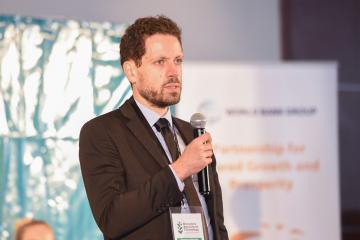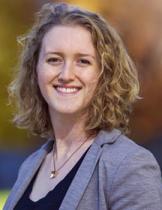
Nana Okozi, J-PAL ‘16, on managing data from start to finish

The Alumni Spotlight series highlights J-PAL alumni who are making an impact across industries and around the world. To nominate a J-PAL alum to be featured in a future Alumni Spotlight, please fill out this form.
We caught up with Nana Okozi, a former project officer at J-PAL Africa. Nana joined J-PAL Africa in 2015 and led training and data collection for many of its research projects. Now a project coordinator at the National Institute for Communicable Diseases (NICD), Nana is helping to coordinate research on drug resistance in South Africa.
What drew you to the field of development? Tell us a bit about what you were looking for in a career and how you learned about J-PAL.
When I first started studying, I thought I was going to become a psychologist. During my third year of university, I grew more and more drawn to research and the ethics of research. I found the research side to be interesting and I thought this would be a space where I could personally make more of a difference.
Then I heard about J-PAL through a research assistant who was working there at the time. She explained what the organization does and I found it to be very interesting. I applied for an internship at J-PAL Africa to get a bit more work experience. I interned for two months and then was offered a full time position.
You worked at J-PAL Africa as a project officer in Johannesburg. Can you tell us about your role?
I didn’t focus on one particular sector or topic—I wanted to learn it all! I first started working on a transportation RCT, but I was always looking to learn more across different sectors. My day-to-day activities included assisting in training enumerators, making sure that field staff had the right equipment, ensuring that the data was verifiable, and doing quality checks.
I then moved to working with Harambee—an organization working to promote youth employment in South Africa—on their work-seeker program, mainly doing monitoring and evaluation. I assisted with training and helped to administer questions. My work with Harambee was particularly fulfilling because I got to work with psychometrists and interact directly with youth in the program.
Which skills or experiences that you picked up during your time at J-PAL Africa are most relevant to the work that you do today?
Working at J-PAL was very eye-opening for me and I learned a lot of fundamentals. At the beginning of every year, we had to complete a course showing that we understood good research practice: getting consent from survey participants, drafting questionnaires, writing proposals, understanding why you need demographic information, data analysis, and understanding how all these steps fit together. We used to do data checks almost every day and we used to report weekly. It really saved us a lot of time and the data was more valid and reliable. But with bigger organizations this can be quite difficult.
Through the training process, you learn to understand why and how the data that you collect from participants will influence analysis and policy at the end. You had to know how all the different components interact and how to continuously monitor how each piece (i.e training, analysis, data collection) affects the other. This was crucial to my work at the time, but it has also really helped me even beyond J-PAL. I also learned how to manage people, how to coordinate between members of a team, and how to be more understanding as a supervisor.
My sense is that some bigger companies don’t really concentrate as much on skills development or on how employees want to grow inside the company; like there is less of a focus on the individual. But at J-PAL everyone was very helpful, and I got the sense that many around me were invested in my growth.
You are now a project coordinator at the National Institute for Communicable Diseases (NICD) in South Africa. Could you tell us a little about your current role?
As a project coordinator I mainly assist one of the pathologists at the Institute with her research. We’re working on analyzing previous drug resistance surveys, along with data cleaning and quality checking the data from the surveillance reports. We transfer this data to an epidemiologist, who writes papers and gives presentations to the Department of Health.
I also worked on the country’s first tuberculosis prevalence survey—the report is still in the works and will probably be released at the beginning of next year. The Institute also conducts validations with companies. We have a couple of studies under way: one reporting on drug resistance which will then be forwarded to relevant stakeholders.
What do you look forward to doing in the future, and what advice would you give to those who are interested in exploring a career in research and data management?
I would love to continue to work in the field rather than just in the office dealing with data and reports. So I would like to be involved in training, managing data collectors and field workers, and monitoring—the whole process from beginning to end to ensure that there are no missing links.
My advice to others who are exploring a career in this field: Learn all that you can. Study and gain more knowledge. Learn from others as much as you can. Don’t choose money over happiness!
Related Content

Adrien Bouguen, J-PAL ‘12, on his path from research assistant to assistant professor

Amanda Dawes Ibáñez, J-PAL ‘14, is at the nexus of research and policy design



